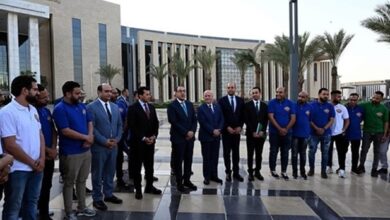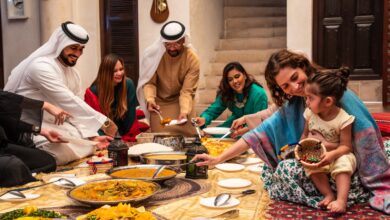Ramadan is a time of fasting, self-restraint, and good deeds. It is also an occasion for storytelling, either in celebration of the nightly feast or as a way to pass the time. In the spirit of the long days and longer nights of Ramadan, Al-Masry Al-Youm shares stories and tips for a good month in a new series called “Alf Leila We Leila: Stories for Ramadan Through the Ages.” Throughout the holy month, we will post original pieces from the Al-Masry Al-Youm staff on everything from how to host a perfect iftar to reports of Ramadan abroad, alongside Arabic literature from Sheherazade to Mahfouz.
Below, reporter Sara ElKamel–whose recent pieces cover the resurrection of Egypt's ancient musical past and Egyptian contemporary art–discusses how the holy month affects our five senses.
There’s something about Ramadan. There’s an ethereal force in the air, a challenge for the senses. For thirty days, you experience a heightened sense of taste as you devour iftar after a day’s fast; you listen to the soothing sounds of Quran; you watch endless commercials and sappy soap operas; you smell an unbelievable amount of food; you simply feel different.
Taste and Smell
The month when you fast from sunrise till sundown is the month when you are allowed to spend your time, from sundown till sunrise, eating. But it’s not any old food you get to munch on for endless hours. Iftar consists of an extensive banquet, with simply much more food than you would normally eat. You double your portions and discard any dietary rules you had placed for yourself. "I’ve been fasting all day," you think. "Leave me alone."
While not everyone enjoys dessert after lunch or dinner for 11 months out of 12, during Ramadan desert is a must. You stock up on raisins, dried figs, and other dried fruit, and purchase traditional oriental sweets such as basbousa, konafa, atayef, and eish saraya. Frequent trips to your kitchen ensure that visits to a nearby pastry shops will also increase.
Listen
Ramadan gathers people together, brings them to mosques, and induces couch potato syndrome. You are subjected to noise that, basically, never ends.
Inviting relatives and friends to share iftar or sohour is extremely common during Ramadan. Such guests bring gossip, spoken in hushed tones (if you’re lucky) or screamed across the dinner table. And as the feasting continues, the cling and clatter of cutlery lingers as you load the dishes with food, dessert, and more dessert.
Needless to say, the TV must be switched on at all times.
The constant stream of commercials for oil, charities, liquid and non-liquid soap is garnished with soap operas that you somehow become addicted to. The proliferation of talk shows expose you the chatter of some of your most or least favorite stars, and for some reason you are suddenly extremely captivated by their stories of success.
But perhaps the sound that best characterizes Ramadan is that emanating from mosques. You revel at the sound of the maghreb azan, which signals that you can finally gulp down some water, and you experience an unmatched sense of gratitude for the plate of food staring right at you. The nighttime taraweeh prayer draws many Muslims who seek to make the best of the holy night. The sheikh’s words blast through the microphone, somehow speaking straight to your heart.
See
Your eyes witness many unfamiliar sights during Ramadan. Everywhere you turn, you find traditional red and blue tent fabric covering the charity iftar banquets on the street, and groups of kindly individuals distributing colorful bags of sugar, oil, and other foods to the less fortunate.
At schools, youngsters celebrate the spirit of the holy month by cutting up colored cardboard and artfully carving out the famous Ramadan fanoos, or lantern. At home, you watch actors and prominent personalities dressed up and get ready to flaunt their stardom to millions of viewers.
Touch
You feel different during Ramadan. You suddenly feel much more spiritual. For thirty days, you fight desires during the day and you have the chance to spend the night exploring religion.
However you want to spend your Ramadan, just remember that it’s not all about the food.




